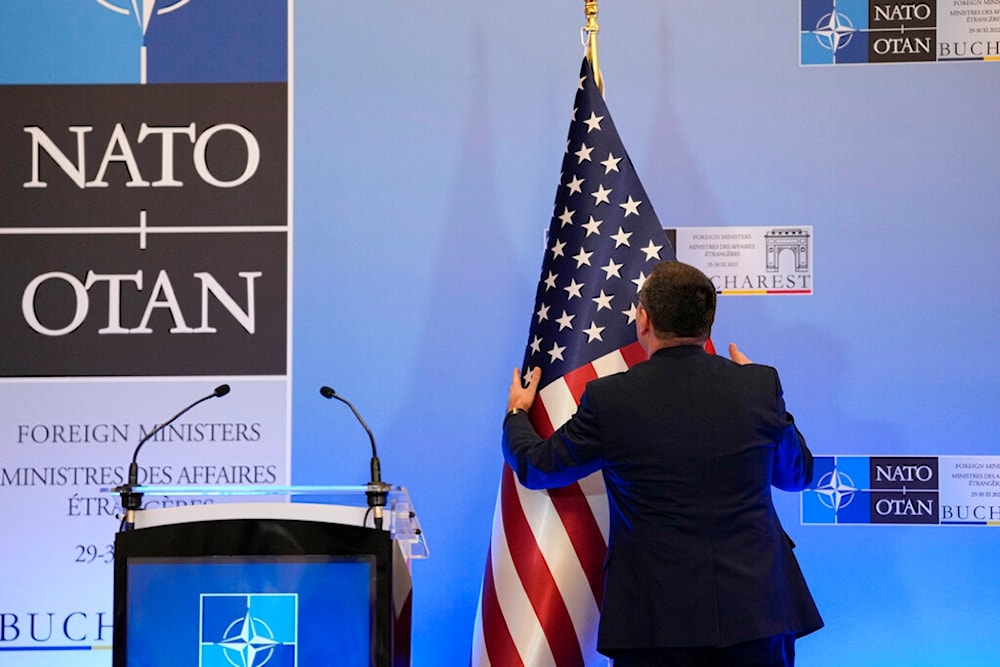US weighs relinquishing long-time NATO command role: NBC News
Separately, the US is expected to halt a planned expansion of US Forces Japan, saving an estimated $1.18 billion.
-
 A man sets up a US flag before then-United States Secretary of State Antony Blinken's press conference in Bucharest, Romania, Wednesday, Nov. 30, 2022 (AP)
A man sets up a US flag before then-United States Secretary of State Antony Blinken's press conference in Bucharest, Romania, Wednesday, Nov. 30, 2022 (AP)
The Pentagon is undertaking a significant overhaul of US military combatant commands and headquarters, with one proposal under consideration involving giving up the US role as NATO’s Supreme Allied Commander Europe (SACEUR), NBC News reported on Tuesday, citing two defense officials.
The current SACEUR, who also heads the US European Command, has played a pivotal role in coordinating support for Ukraine in its war with Russia. The timeline for any restructuring remains uncertain and could be modified before completion. Congressional intervention is also possible, particularly if lawmakers object to aspects of the initiative.
Withdrawing the SACEUR position would represent a profound symbolic shift in NATO’s power dynamics, potentially impacting the alliance that has been central to European security since World War II.
“For the United States to give up the role of supreme allied commander of NATO would be seen in Europe as a significant signal of walking away from the alliance,” retired Adm. James Stavridis, who served as SACEUR from 2009 to 2013, emphasized in an email.
“It would be a political mistake of epic proportion, and once we give it up, they are not going to give it back," he cautioned. "We would lose an enormous amount of influence within NATO, and this would be seen, correctly, as probably the first step toward leaving the Alliance altogether.”
Since former US President Dwight D. Eisenhower inaugurated the SACEUR role, it has been held by several of America’s most notable military leaders, including Alexander Haig, John Shalikashvili, and Wesley Clark.
The proposed restructuring aligns with the Trump administration’s broader efforts to cut spending and federal workforce numbers. President Donald Trump and Defense Secretary Pete Hegseth have emphasized that European allies must assume greater responsibility for their own defense. Should the US relinquish the SACEUR role, NATO members would have to decide which nation would assume the position.
Trump has frequently criticized NATO members for failing to meet the alliance’s defense spending targets. He has also considered a major policy shift that could see the US declining to defend NATO allies that do not meet their defense spending commitments, a move that challenges a core tenet of the alliance.
If enacted, the restructuring would consolidate five of the military’s 11 combatant commands, according to the two defense officials. Additionally, the plan under consideration includes merging US European Command (EUCOM) with US Africa Command (AFRICOM) in Stuttgart, Germany, and closing the US Southern Command (SOUTHCOM) headquarters in Florida to merge it with US Northern Command (NORTHCOM).
Officials familiar with the planning argue that combining commands would reduce redundancy and cut costs, with potential first-year savings estimated at $270 million—about 0.03% of the Pentagon’s $850 billion annual budget. However, critics suggest that the changes are driven by cost-cutting rather than strategic military planning.
Retired Lt. Gen. Ben Hodges, former senior US Army commander in Europe, warned that the reorganization could diminish American influence by reducing access to key military bases in Italy, Germany, Poland, and Spain.
“When you start reducing capabilities of headquarters that do planning and intelligence — that only hurts us,” Hodges told NBC News. "This has happened so early that this clearly smells like a cost-cutting thing than a strategic analysis.”
Combining EUCOM and AFRICOM may also prove problematic due to the vast geographical scope and distinct challenges of both regions, Stavridis indicated.
"Combining US European command and US Africa command into a single unit creates a mega combatant command that really is too large for any single person to manage realistically,” he wrote. “Too many countries, too many people, too many disparate issues."
The two defense officials said that if EUCOM and AFRICOM are merged, it could further justify eliminating the SACEUR role, given the already extensive responsibilities of overseeing such a large region.
Critics warn that closing geographic commands introduces political risks, as affected nations may perceive the US as deprioritizing them.
Additionally, the restructuring plan includes relocating hundreds of Joint Staff personnel from the Pentagon to Suffolk, Virginia, and eliminating the J7 Directorate, responsible for joint force training. This move could result in the dismissal of approximately 375 civilian employees, primarily in planning, cyber, and force development.
Further cost-saving measures include eliminating US Space Command’s missile defense component, as its functions are deemed redundant. The Pentagon estimates that these restructuring efforts could save $470 million over five years.
Separately, the US is expected to halt a planned expansion of US Forces Japan, saving an estimated $1.18 billion. However, the decision carries diplomatic risks, as it may impact command and control capabilities in the Indo-Pacific region.
Read more: US to drop out of future NATO military exercises in Europe

 5 Min Read
5 Min Read








